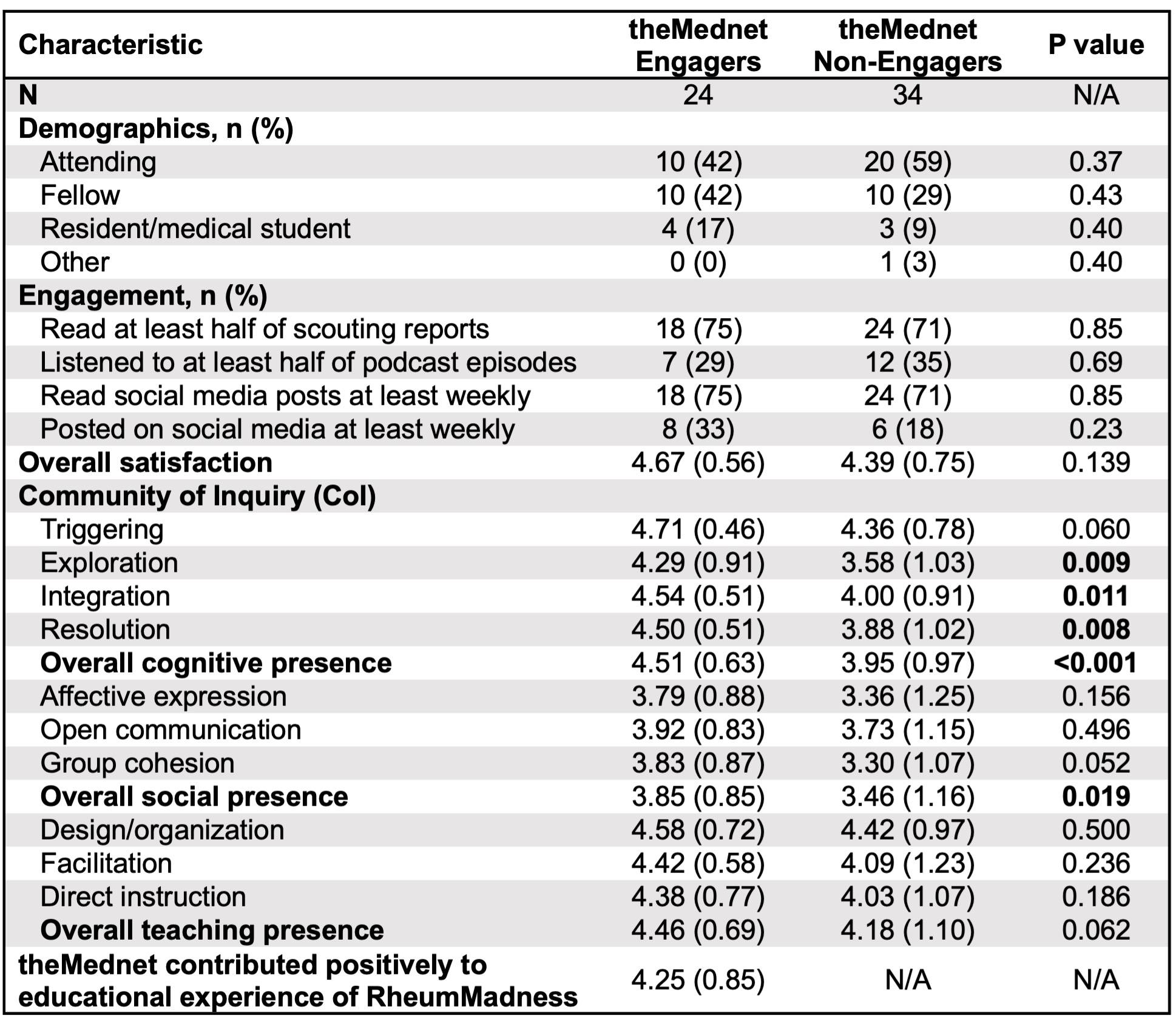Session Information
Session Type: Abstract Session
Session Time: 2:00PM-3:30PM
Background/Purpose: RheumMadness is an online tournament of rheumatology concepts that has been shown to engage learners using the Community of Inquiry (CoI) framework. theMednet is another online educational platform in which physician users submit clinical questions that are answered by experts in the field in an interactive question and answer forum. We sought to evaluate the educational impact of integrating content and engagement between these two independent learning platforms.
Methods: The 2023 RheumMadness tournament consisted of 22 teams of competing concepts that were presented as scouting reports written by trainees and rheumatologists. On the day that scouting reports were published, 7 clinically-focused questions relating to specific RheumMadness teams (6 curated by theMednet team, 1 user-submitted) were posted on theMednet along with expert responses. Leadership teams from both RheumMadness and theMednet publicized updates about each other’s initiatives on their respective platforms. At the conclusion of the tournament, all participants, excluding leadership team members, were invited to complete a voluntary survey that assessed engagement in RheumMadness and theMednet as well as educational impact using the CoI framework. Surveys used Likert scores (1=very dissatisfied/strongly disagree, 5=very satisfied/strongly agree). Engagement in RheumMadness content on theMednet was examined and compared to that of its 5 most recent comparable educational programs. Statistical analyses were performed using Chi-square tests and unpaired T tests as appropriate.
Results: RheumMadness-related questions posted on theMednet and associated engagement are shown in Table 1; views per question ranged from 244 to 627, and number of poll voters per question from 53 to 80. When compared with the 5 most recent comparable educational programs on theMednet (Table 2), RheumMadness questions reached more users and institutions, and RheumMadness questions had significantly more views than questions from other educational programs (mean 459 vs. 249 views/question, respectively). Among RheumMadness participants, demographics and engagement with other RheumMadness curricular elements were similar between participants who engaged with theMednet content (n=24) and non-engagers (n=34), but CoI engagement was significantly higher in the overall cognitive presence and 3 of its components as well as the overall social presence among theMednet engagers (Table 3). Participants who engaged with theMednet Q&A reported that it contributed positively to the educational experience of RheumMadness (mean Likert score 4.25).
Conclusion: Establishing a collaboration between RheumMadness and theMednet strengthened learning in both programs. In addition to an effect of the collaboration, engagement with RheumMadness-related questions compared with previous educational programs on theMednet may have also been enhanced by the growing overall number of users over time and more varied nature of the topics presented in RheumMadness compared with previous programs. Collaborations between educational programs should be encouraged, as this may allow programs to reach broader audiences and accomplish more effective learning.
To cite this abstract in AMA style:
Katz G, Briones M, Couette N, Balbach M, Usmani S, He L, Macklin M, Qaiser I, Kellogg J, Bair C, Lueck B, Garren A, Sparks M, Criscione-Schreiber L, Leverenz D. RheumMadness and TheMednet: The Impact of a Collaboration Between Independent Educational Initiatives [abstract]. Arthritis Rheumatol. 2023; 75 (suppl 9). https://acrabstracts.org/abstract/rheummadness-and-themednet-the-impact-of-a-collaboration-between-independent-educational-initiatives/. Accessed .« Back to ACR Convergence 2023
ACR Meeting Abstracts - https://acrabstracts.org/abstract/rheummadness-and-themednet-the-impact-of-a-collaboration-between-independent-educational-initiatives/



